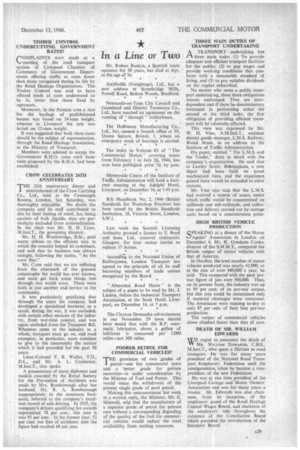TIMBER CONTROL UNDERCUTTING GOVERNMENT RATES?
Page 31

If you've noticed an error in this article please click here to report it so we can fix it.
COMPLA1NTS were made at a meeting of the road transport section of Liverpool Chamber of Commerce of Government Departments offering traffic at rates lower than those recognized during its life by the Road Haulage Organization. The Timber Control was said to have offered loads at rates understood to be 35. lower than those fixed by operators.
Moreover, in the Preston area a rate for the haulage of prefabricated houses was based on 14-tons weight, whereas in Liverpool the rate was levied on 12-tons weight.
It was suggested that both these cases should be the subject of representation, through the Road Haulage Association, to the Ministry of Transport.
Members were advised to accept the Government R.H.O. rates until basic rates proposed by the R.H.A. had been established.
CROW CELEBRATES 26TH ANNIVERSARY THE 26th anniversary dinner and entertainment of the Crow Carrying Co., Ltd., held at the Connaught Rooms, London, last Saturday, was thoroughly enjoyable. No doubt the company and its staff contributed to this by their feeling of relief, for, being carriers of bulk liquids, they. are particularly excluded from nationalization. In the chair was Mr. H. H. Crow, Minst.T., the governing director.
Mr. H. H. Woolveridge, B.Sc., paid warm tribute to the efficient why in which the concern helped its customers, and said that its business was always straight, following the motto, "As the crow flies."
Mr. Crow said that we are suffering from the aftermath of the greatest catastrophe the world has ever known, and must get back some things lost through two world wars. These were faith in one another and service to the community.
It was particularly gratifying that through the years his company had developed a specialized business; as a result, during the war, it was excluded, with certain other sections of the industry, from war-time control, and was again excluded from the Transport Bill. Whatever came to the industry as a whole, transport must go on, and road transport, in particular, must continue to give to the community the service which it had provided for the past 50 years.
Lieut.-Colonel F. R. Waller, T.D., DL., and Mr. A. L. Castleman, M.Inst.T., also spoke.
A presentation of many diplomas and medals awarded by the Royal Society for the Prevention of Accidents was made by Mrs. Rossborough after her husband, Mr. R. A. Rossborough (appropriately in the insurance business), referred to the company's excellent record of safe driving. In 1935, the company's drivers qualifying for awards represented 78 per cent.; this year it was 93 per cent. In the former year, 32 per cent. ran free of accidents; now the figure had reached 68 per cent.
POORER PETROL FOR COMMERCIAL VEHICLES?
T"provision of two grades of petrol—one for commercial users and a better grade for prislate motorists—is under consideration by the Minister of Fuel and Power. This would mean the withdrawal ofthe present single grade of pool petrol.
Making this announcement last week in a written reply, the Minister, Mr. E. Shinweli, said that the manufacture of a superior grade of petrol for private cars without a conesponding degrading of the quality of the fuel for commercial vehicles would reduce the total availability from sterling resources. THREE MAIN DUTIES OF TRANSPORT UNDERTAKING
ATRANSPORT undertaking has
three main tasks: (1) To provide adequate and efficient transport facilities for the public; (2) to pay wages and provide working conditions that conform with a reasonable standard of living, and (3) to pay suitable dividends on the capital subscribed.
No matter who owns a public transport undertaking, these three obligations remain unchanged. They are interdependent and if there be discriminatory treatment in performing either the second or the third tasks, the first obligation of providing efficient transport will be adversely affected.
This view was expressed by Mr. W. H. Vine, A.M.Inst.T., assistant district goods manager, L.M.S. Railway, Broad Street, in an address to the Institute of Traffic Administration.
His paper, entitled "The L.M.S. and the Trader," dealt in detail with the company's organization. He said that at Lawley Street, Bilmingham, a new depot had been built on novel mechanized lines, and the experience gained there would be extended to other stat ions.
Mr. Vine also said that the L:M.S. had evolved a system of zones, under which traffic would be concentrated on railheads and sub-railheads, and collection and delivery carried out by cartage units based on a concentration point.
HIGH BRITISH VEHICLE PRODUCTION
SPEAKING at a dinner of the Motor Agents' Association in London on December 4, Mr. R. Gresham Cooke, director of. the S.M.M.T., compared the British output of motor vehicles with that of America.
In October, the total number of motor vehicles produced was nearly 41,000, or at the rate of over 480,000 a year, he said. This compared with the peak prewar figure of just over 500,000. Thus, on its present form, the industry was up to 95 per cent, of its pre-war output. but this rate could be maintained only if material shortages were overcome. The Americans were running to-day at only 85 per cent, of their best pre-war production.
The output of commercial vehicles alone climbed faster than that of cars.
• DEATH OF MR. WILLIAM EDWARDS
WE regret to announce the death of 'WV MR. WILLIAM EDWARDS, C.B.E., Minst.T., who spent a lifetime in road transport. He was for many years president of the National Road Transport Employers' Federation until the amalgamation, when he became a vicepresident of the new Federation.
I-le was at one time president of the = Liverpool Cartage and Motor Owners' Association and was for many years a trustee. Mr. Edwards was also chairman, from its inception, of the employers' panel of the Road Haulage Central Wages Board, and chairman of the employers' side throughout the existence of the Conciliation Board which preceded the introduction of the Statutory Board.












































































